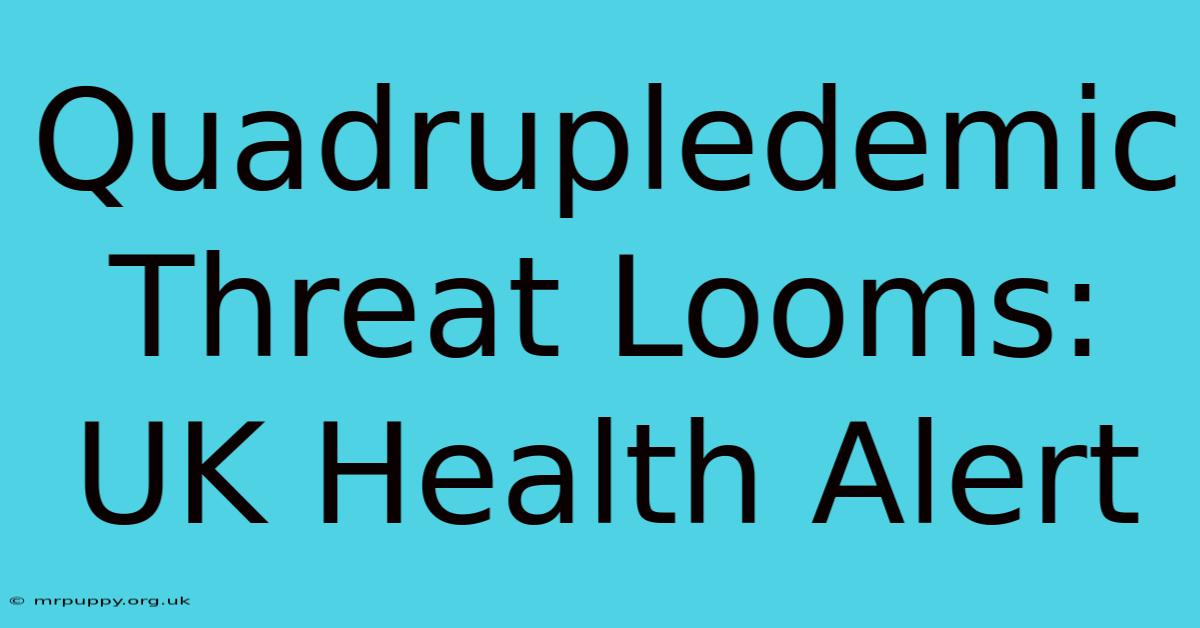Quadrupledemic Threat Looms: UK Health Alert
Is the UK facing a simultaneous wave of four major illnesses this winter? Experts warn of a potential "quadrupledemic," raising serious concerns about the strain on the NHS.
Why It Matters: The potential convergence of influenza, COVID-19, RSV, and Strep A could overwhelm the NHS, leading to longer wait times, increased pressure on staff, and potential shortages of essential medical supplies. Understanding the severity of this threat and taking preventative measures is crucial.
Key Takeaways:
| Illness | Symptoms | Potential Impact on NHS |
|---|---|---|
| Influenza | Fever, cough, chills, muscle aches | Increased hospital admissions, strain on resources |
| COVID-19 | Fever, cough, loss of taste/smell, fatigue | Strain on ICU capacity, potential for long-term health effects |
| RSV | Runny nose, cough, wheezing, fever | High demand for pediatric care, potential for respiratory complications |
| Strep A | Sore throat, fever, swollen glands, rash | Increased demand for antibiotics, risk of complications like scarlet fever |
The Quadrupledemic Threat
This winter, the UK faces a unique challenge with the potential for a simultaneous surge in four major illnesses. The combination of influenza, COVID-19, RSV, and Strep A, known collectively as the "quadrupledemic," could strain the NHS beyond its capacity.
Influenza: Seasonal influenza, commonly known as the flu, poses a significant threat, particularly to vulnerable populations. With reduced immunity due to COVID-19 lockdowns and a waning effectiveness of the flu vaccine, the risk of severe illness and hospitalization increases.
COVID-19: While the UK has experienced a decline in COVID-19 cases, the virus continues to circulate. The emergence of new variants, such as Omicron subvariants, could lead to another wave of infections, particularly during the winter months.
RSV: Respiratory syncytial virus (RSV) is a common respiratory virus, particularly affecting infants and young children. However, this year, a surge in RSV cases is being observed, with a higher than usual number of cases presenting with severe illness.
Strep A: Strep A infections, while usually mild, have seen a rise in cases this year. The increased prevalence of scarlet fever, a serious complication of Strep A, further emphasizes the importance of vigilance.
Impact on the NHS
A simultaneous wave of these four illnesses would place immense pressure on the already strained NHS. Here's how:
- Increased Hospital Admissions: The surge in cases could lead to an overwhelming influx of patients needing hospital care, particularly those with severe illness.
- Strain on Resources: The increased demand for beds, staff, and resources could lead to longer waiting times, potential shortages of medications, and a higher burden on healthcare workers.
- Potential for Overwhelm: In the worst-case scenario, the NHS could be overwhelmed, potentially leading to delays in treatment, an increase in complications, and a higher risk of mortality.
How to Prepare
While the possibility of a quadrupledemic is a serious concern, there are measures individuals can take to protect themselves and alleviate the strain on the NHS:
- Vaccination: Getting vaccinated against flu and COVID-19 is the most effective way to prevent severe illness and hospitalization.
- Good Hygiene: Practicing good hygiene, such as frequent handwashing, covering coughs and sneezes, and avoiding close contact with sick individuals, can significantly reduce the spread of these illnesses.
- Early Detection and Treatment: Seeking medical attention early for symptoms can help prevent complications and ensure timely treatment.
- Stay Informed: Staying informed about the latest health advice and guidelines is essential to making informed decisions and taking appropriate precautions.
FAQs
- Q: What is the most concerning aspect of the potential quadrupledemic?
- A: The potential for a simultaneous surge in all four illnesses, leading to an overwhelming influx of patients in need of critical care.
- Q: Is the NHS prepared for a potential quadrupledemic?
- A: The NHS has prepared for a surge in demand, but the simultaneous threat of four illnesses could strain resources beyond their current capacity.
- Q: What can I do to protect myself from the potential quadrupledemic?
- A: Get vaccinated against flu and COVID-19, practice good hygiene, and seek medical attention early if you experience symptoms.
- Q: How can I help the NHS during this potential crisis?
- A: Follow health advice, get vaccinated, stay informed, and use the NHS only for urgent needs.
Tips to Stay Healthy
- Wash your hands frequently: Use soap and water or hand sanitizer to wash your hands often, especially after touching surfaces or being in public spaces.
- Cover coughs and sneezes: Use a tissue or your elbow to cover your mouth and nose when coughing or sneezing.
- Avoid close contact with sick individuals: If you are feeling unwell, stay home to avoid spreading your illness.
- Get enough sleep and eat a healthy diet: A strong immune system is essential for fighting off illness.
- Stay hydrated: Drinking plenty of fluids can help prevent dehydration, particularly important when you are sick.
- Maintain a healthy weight: Obesity can increase your risk of complications from respiratory illnesses.
Summary
The potential for a quadrupledemic this winter in the UK is a serious concern, with the possibility of a simultaneous surge in influenza, COVID-19, RSV, and Strep A cases. This could place immense pressure on the NHS, leading to longer wait times, increased pressure on staff, and potential shortages of essential medical supplies. While the threat is real, individuals can take proactive measures to protect themselves and minimize the impact on the NHS. Vaccination, practicing good hygiene, early detection, and staying informed are crucial steps in mitigating the potential risks of a quadrupledemic.

